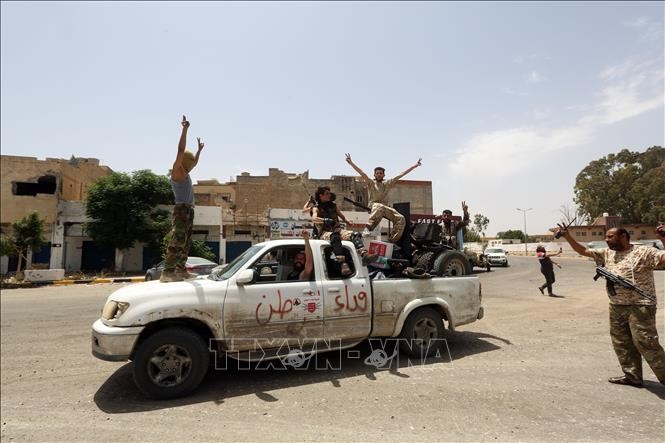(VOVWORLD) - Violence in Libya has been growing. Since its leader Muammar Gaddafi was overthrown 9 years ago, Libya has been engulfed in conflict between factions backed by outside forces. A peaceful solution has repeatedly been tabled in negotiations. It may be a long time before the people of Libya can live in peace.
 The UN-sponsored government forces in the Qasr bin Ghashir region, south of Tripoli, Libya, June 4, 2020. (Photo: Xinhua/ VNA) The UN-sponsored government forces in the Qasr bin Ghashir region, south of Tripoli, Libya, June 4, 2020. (Photo: Xinhua/ VNA) |
What has happened since Gaddafi was toppled in 2011 shows that tanks and cannons cannot be the solution to the Libyan conflict.
Tensions caused by external factors
Libya now has two governments. The Government of National Accord (GNA) backed by the UN, and the armed groups backed by Turkey are operating in the capital, Tripoli. Meanwhile, the Libyan National Army (LNA) in Eastern Libya is backed by the United Arab Emirates (UAE), Russia, and Egypt. Violence has been escalating since April 2019 when General Khalifa Haftar began a military campaign to gain control of Tripoli. This month saw tensions as a confrontation loomed between Turkey and Egypt.
GNA has been expanding its control to areas of northwestern Libya previously occupied by LNA, after repelling the LNA drive to capture Tripoli. The GNA says it will soon regain control of Sirte, the gateway to Eastern Libya's oil fields, and Jufra air base. Turkey has sent thousands of troops from Syria to Libya to support the GNA. That move, described as " the straw that broke the camel's back", angered Cairo. Egyptian President Abdel-Fattah El-Sisi warned that Cairo has the legal right to intervene in the Libyan situation, calling Sirte and Al-Jufra the "red line" of Egypt’s national security.
The Egyptian Parliament on Monday unanimously authorized the president to deploy Egypt’s armed forces on combat missions across the border. The Egyptian president said his country’s intervention in Libya is aimed at protecting the national security of Egypt, Libya and the wider region, safeguarding Egypt’s western border area, and restoring stability to Libya.
Turkey's National Security Council, meanwhile, reaffirmed its support for the GNA in Tripoli, pledging "to stand side by side with the Libyan people to fight all acts of tyranny,” and said Turkey “will not hesitate to take the necessary steps.” Turkey's statement left open the possibility of direct conflict with Egypt.
Call for tension de-escalation
Obviously, the Libya conflict has worsened as a result of external intervention. A UN representative repeated the UN’s consistent message that there is no other option but a political solution to the Libyan conflict.
Germany, France, and Italy threatened to punish parties violating the embargo on sea, land, and air embargo. The three countries called on all factions and their foreign backers to immediately halt the current military escalation. Russia urged an "immediate ceasefire and suspension of fighting" to begin a national political dialogue.